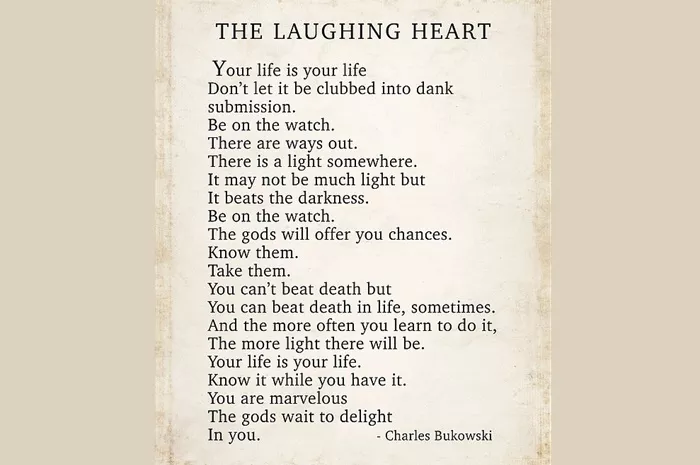Welcome to Poem of the Day – The Laughing Heart by Charles Bukowski.
Charles Bukowski’s poem The Laughing Heart presents a dynamic and empowering message about life, agency, and the transformative power of seizing opportunities. Unlike many of Bukowski’s works, which often focus on darker or more nihilistic themes, The Laughing Heart stands as a beacon of resilience and self-awareness. Through its simple yet profound language, the poem implores the reader to take control of their existence, urging them to find light even amidst the darkness of life. The poem offers a message of hope, freedom, and the importance of self-determination, all wrapped in the kind of raw authenticity that is a hallmark of Bukowski’s style.
The Laughing Heart
your life is your life
don’t let it be clubbed into dank submission.
be on the watch.
there are ways out.
there is a light somewhere.
it may not be much light but
it beats the darkness.
be on the watch.
the gods will offer you chances.
know them.
take them.
you can’t beat death but
you can beat death in life, sometimes.
and the more often you learn to do it,
the more light there will be.
your life is your life.
know it while you have it.
you are marvelous
the gods wait to delight
in you.
The Laughing Heart Explanation
1. The Struggle Against Submission
From the very first line of the poem, Bukowski asserts the fundamental importance of individual agency: “your life is your life.” This is an imperative, a call to action, not to let life slip into passivity or to be subjugated by external forces. “Don’t let it be clubbed into dank submission,” he warns, using vivid and almost violent imagery to describe the potential for life to be smothered or crushed by societal pressures, personal failures, or the weight of routine existence. The phrase “dank submission” implies a state of decay and stasis, where life is no longer vibrant or meaningful but instead is suffocated in gloom. Bukowski’s warning is clear: passivity is akin to death, and life should not be lived in resignation or defeat.
2. Hope Amidst Darkness
Yet, the poem is not simply a bleak commentary on the nature of existence. Bukowski follows the stark opening with an affirmation of hope: “there is a light somewhere.” This light, though described as faint (“it may not be much light but / it beats the darkness”), represents the possibility of transcendence and the potential for personal growth. Even the smallest glimmer of light can push back the darkness, suggesting that hope, though fragile, is a powerful force. Bukowski encourages the reader to be vigilant, “be on the watch,” to look for the light in even the smallest, most unexpected places.
3. The Power of Seizing Opportunities
Another key message of the poem is the idea that life is full of opportunities, but they require awareness and action to be fully realized. Bukowski writes, “the gods will offer you chances. / know them. / take them.” This is a direct exhortation to embrace life’s possibilities, whether they are big or small. The reference to “gods” suggests that these opportunities are divinely inspired or fated, yet they are still within the reach of anyone who is willing to see them and act. The challenge here is not just about waiting for opportunities to arrive, but about recognizing them and having the courage to seize them when they do. It’s about living with purpose, not allowing one’s life to pass by without fully engaging with it.
4. The Inevitable Reality of Death
Bukowski does not shy away from the harsh reality of mortality, acknowledging that while one cannot “beat death,” there is a way to “beat death in life, sometimes.” Here, the poet touches upon the dual nature of existence: while death is inevitable, life itself offers moments of triumph, joy, and meaning that transcend the finality of death. By “beating death” in life, Bukowski suggests that one can find freedom and fulfillment, defying the looming presence of mortality through the choices one makes and the life one lives.
5. The Importance of Self-Awareness
Bukowski emphasizes the value of self-awareness and understanding in the face of life’s challenges. “Your life is your life. / know it while you have it,” he declares. This repetition underscores the importance of actively engaging with one’s life, recognizing it as a gift and an opportunity. The phrase “know it while you have it” serves as a poignant reminder of the finite nature of existence, urging readers to appreciate and take ownership of their lives before it is too late. It calls for mindfulness, the awareness of both the beauty and the difficulty of living, and the responsibility one holds in shaping one’s own destiny.
6. A Celebration of Life’s Marvels
The poem concludes with a declaration of human potential: “you are marvelous.” Bukowski’s tone here shifts from the urgency of survival to the celebration of the individual. In this brief yet powerful line, he affirms the intrinsic worth and beauty of the individual, suggesting that everyone has within them the ability to transcend their limitations and find joy in life’s offerings. This affirmation acts as a counterpoint to the earlier references to death and suffering, reminding the reader that life itself is an extraordinary thing, full of potential and marvel.
Conclusion
In The Laughing Heart, Charles Bukowski presents a timeless meditation on life, death, and the power of personal agency. The poem encourages readers to take control of their existence, to seek out the light even in moments of darkness, and to recognize and act upon the opportunities life provides. Through its straightforward yet impactful language, Bukowski challenges the reader to embrace life in all its complexity, to beat death through living fully, and to recognize the inherent beauty of their own existence. The poem serves as both a warning and an encouragement: life is fleeting, but it is also yours to shape and live to its fullest.

